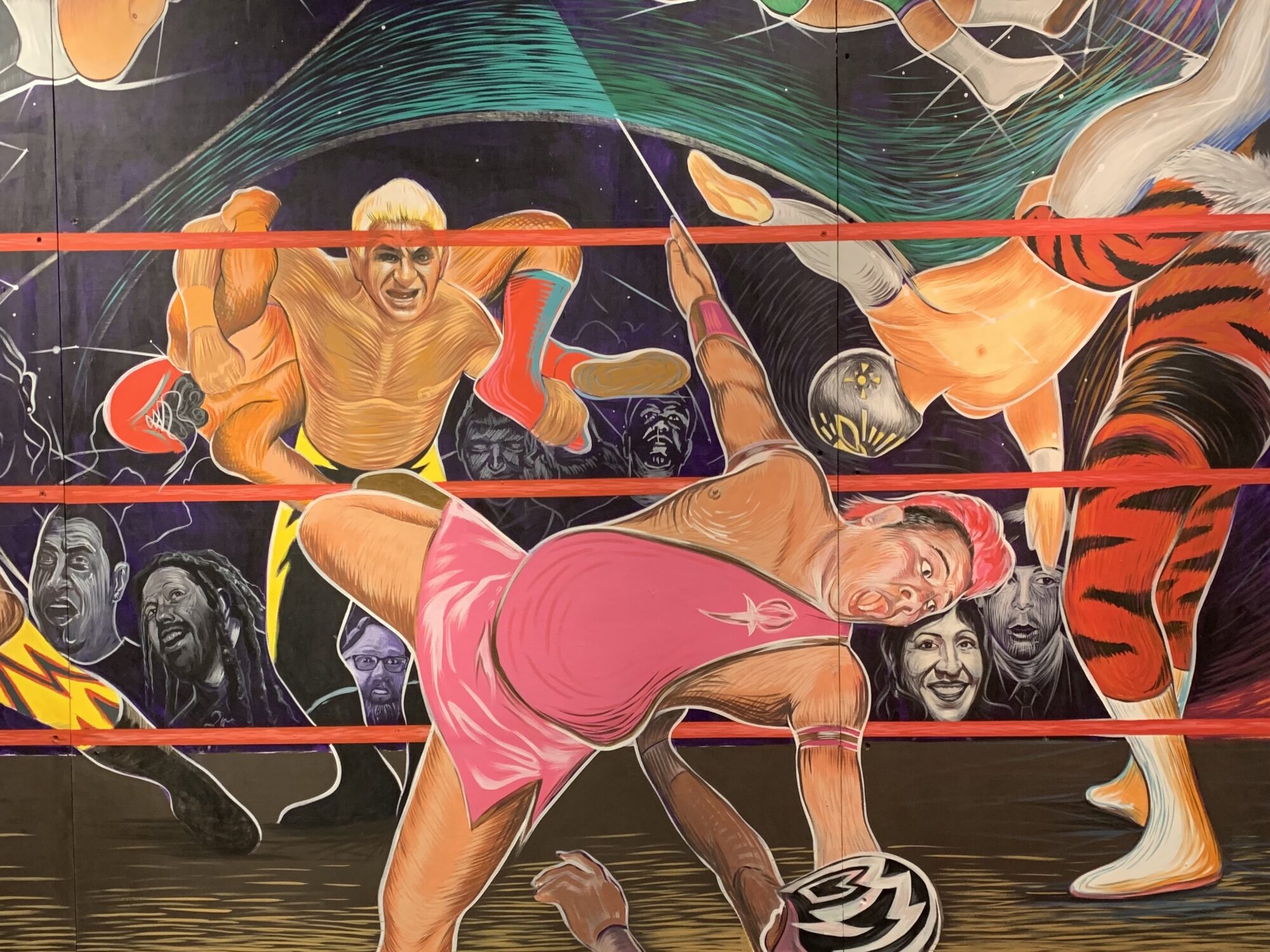Summary
Changemaker Catalyst Award recipient Catie Prechtel traveled to Mexico City in June of 2022 to conduct field research for her dissertation on exótico wrestling within Mexican lucha libre. Catie is entering her 5th year in the PhD in Latin American Studies at Tulane University.
Changemaker Catalyst Award recipient Catie Prechtel traveled to Mexico City in June of 2022 to conduct field research for her dissertation on exótico wrestling within Mexican Lucha libre. Catie is entering her 5th year in the Ph.D. in Latin American Studies at Tulane University.
Through the Taylor Center Changemaker Catalyst Award I have been able to continue collecting data for my dissertation Wrestling with Masculinities: Exploring the Intersections of Gender, Sexuality, and Nationalism Among Exóticos in Mexican Lucha Libre for my Ph.D. in Latin American Studies. My dissertation uses ethnographic data to explore the experiences, identities, and performances of exótico wrestlers (who play stereotypically queer characters) in Mexican Lucha libre. This project connects queer theory, gender and sexuality studies, and performance studies to the topics of exótico wrestling, Lucha libre, and mexicanidad, with the aim of facilitating rich conversations about the transformative potential of the performances of exótico wrestlers.
On June 1st, 2022, I traveled to Mexico City for 3 weeks to continue my fieldwork for my dissertation. During this time, I conducted interviews, networked with luchadores, attended a Lucha Libre match, and visited several museums. Prior to this trip, I had spent 3 months in Mexico City conducting research and interviews, but I had struggled with networking and finding people who were willing to share their stories with me. While some expressed apprehension about talking to a stranger about their personal lives, others explained that they simply didn’t have the time for an unpaid interview. When I returned to Mexico City in June, I decided to take a different approach: I secured funding to compensate future and previous interview participants for their time. In doing so, I hoped to make the interview process more mutually beneficial and ensure that they felt that their time and openness were valued and fairly compensated. This financial aspect, paired with the connections that I’d already made with other wrestlers, allowed me to schedule 8 interviews during the 3 weeks that I was in Mexico City, which doubled the number of interviews I could use in my project. These 16 interviews comprise almost 400 pages of qualitative data, which I have coded and am currently analyzing as I write my dissertation.
It was thrilling to meet so many famous wrestlers I had learned so much about. I was able to meet many of these Luchadores face-to-face and hear their life stories over lunch. Others were kind enough to log onto Zoom or WhatsApp and spend a couple of hours answering my questions about their experiences as wrestlers. Their generosity, introspection, and humor made the interviews both fascinating and entertaining, and have made finishing my dissertation possible. In addition to providing me with valuable interview data, many of these collaborators also offered to accompany me to other Lucha Libre events and help me connect with other potential participants, which would have been difficult to accomplish if I had not been able to travel to Mexico in person.
This research trip took place during the ‘Mes del Orgullo’ LGBTQ+ Pride festivities in June, which brought the topics of queer representation, LGBTQ+ rights, and respectability politics to the forefront of my interviews. I got to ask the participants about their engagement in activism and advocacy (if any) as some of them prepared to participate in Pride parades and events. In addition to Lucha Libre-related activities, I also got to explore other events and art exhibitions in honor of Pride month, which helped contextualize current discussions about gender and sexuality, diversity, and inclusion taking place in Mexico.
This experience helped me develop my networking skills and reconsider my approach to fieldwork. Importantly, this experience prompted me to redesign my interview methodology to meet the needs and interests of potential study participants. Since publicity was a motivating factor for many of these participants, I created a blog that profiles the participants and celebrates their careers. This has given the participants more immediate results while I continue writing my dissertation. You can check out the blog here and learn about a few of the exóticos who have participated in the project!
While many of the participants in my study sought out the positive representations and the international publicity that comes with participating in academic research, I also learned that I couldn’t assume that this would be equally satisfying for all participants. Some wanted more than just the possibility of being mentioned in an academic project in another country– some wanted to see more immediate benefits to sharing their personal experiences and allowing their stories to be analyzed in a dissertation. For many, this meant getting paid for their time. Some participants expressed their concerns about fair pay and unfair representations, which have become pressing issues that have impacted some of them negatively in previous interview experiences. By incorporating financial compensation into the interviews, I was able to respond to these participant-identified concerns and make the research process more equitable.
Through this experience, I have learned about my values as a researcher while also establishing positive relationships with the wrestlers who generously collaborated to make this project possible. Thank you to everyone who made this experience possible!






